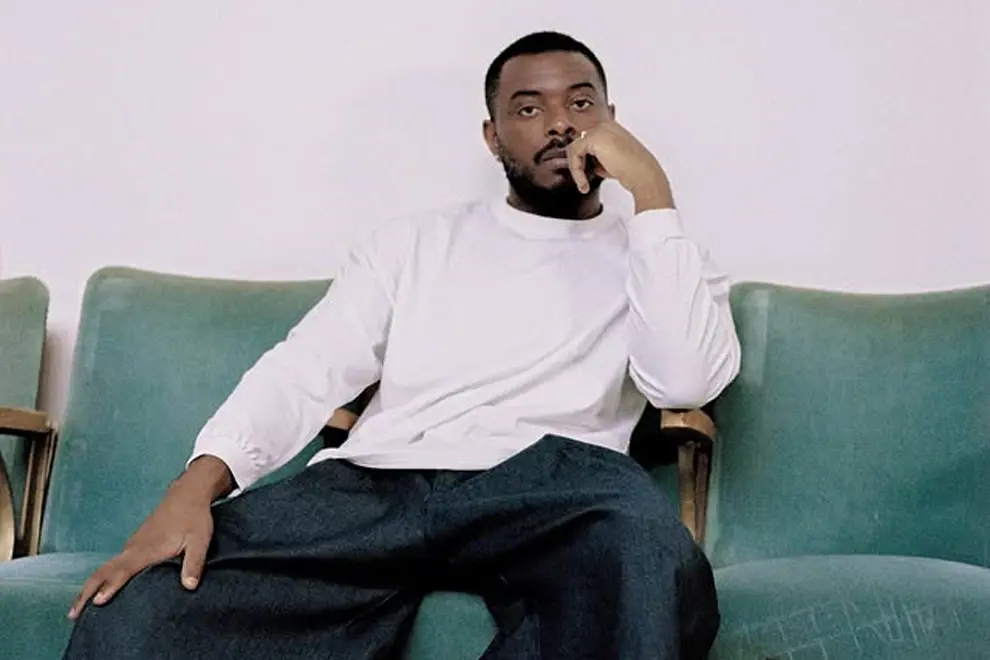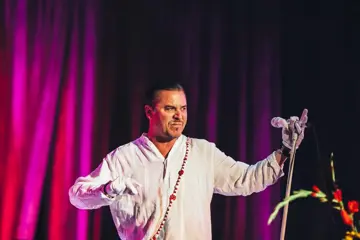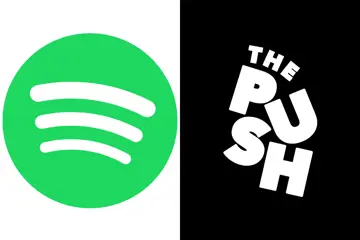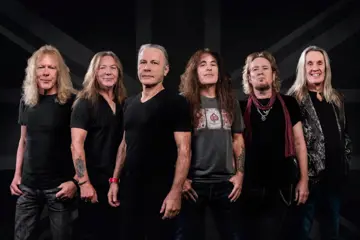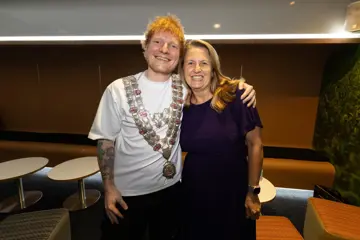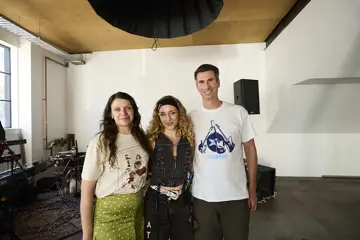This July is going to be a special one for Jerry Agbinya, who is off to the UK thanks to being the nascent recipient of the 2025 Fast Track Fellowship.
Delivered in partnership with the Victorian Music Development Office (VMDO) and the Music Producer And Engineers’ Guild Of Australia (MPEG), the Fast Track Fellowship is an initiative which is vitally important in the current musical climate.
According to the inaugural 2023 survey from the MPEG, almost 45% of music producers and engineers are based in Victoria, with the Australian recording sector serving as a critical force within the country's music scene.
That same survey revealed that 19% of respondents have plans to work overseas with 35% revealing aspirations of an international career, though most are unsure of how to facilitate such a reality.
Don't miss a beat with our FREE daily newsletter
As such, the successful recipient of the Fellowship finds themselves selected to participate in a bespoke program in the United Kingdom for two months. These Fellows will have access to mentors, studios, industry events and be supported with travel logistics and accommodation for up to eight weeks.
For 2025, it's Agbinya who is the recipient, with the talented musician – who is likely better known to music fans as his pseudonym IJALE – having been producing and creating in the music industry for years. Working across the fields of production, mixing, engineering, songwriting, and performance, his creative output includes composition, podcasting, short film scoring, performance and sonic branding.
Now, he's heading overseas next month to embark on the next stage of his career, which serves as not only a new chapter of his professional development, but something of a culmination of his own experience with the musical world.
For Agbinya, his love of music can be traced back around two decades, likely to the first time when he discovered UK indie rock icons Bloc Party, with their 2005 debut album Silent Alarm giving him a taste of what's possible in the creative game.
"The riffs were just so angular and abrasive, but also smart and intelligent," he recalls. "There was so much attitude, but it was still cool and not too in-your-face.
"Bloc Party was just so crazy, and the lead singer was black and I didn't know that we had a space in indie rock type music," he adds. "I was like, 'Alright, sick, let me see how this goes.'"
Though Agbinya had already been experimenting with music by way of playing guitar and attending music class in school, it was around the time that Silent Alarm arrived that he began creating with others.
"I actually got really involved in playing in a band with my two mates," he remembers. "Then I had started delving into music production, which I would say is the jumping-off point for what I do now.
"Music production kind of changed everything for me, rather than being in a band"
Like every musician, Agbinya's earliest musical goals were humble. Though fame and fortune would have been nice, he wasn't exactly plotting for global music domination when he first kicked things off in earnest.
"I didn't have as much hubris as I might have now," he admits with a laugh. "I think it was just to occupy my time. I like doing things on my own and I like my own company, so music production allowed me to focus on something while just kind of like playing with things and taking my own time
"Aas a passion for it grew, I just wanted to challenge myself with things that I was seeing and things that I was hearing," he adds. "I wanted to try to be like Flying Lotus and I wanted to do things like all these beat-makers in Los Angeles were doing, and I just found that really inspiring."
It took a few years for any of Agbinya's own music to formally arrive, with a collaborative duo with friend Kirk Brody also taking place in the midst of it all.
"When I first started producing, it would take maybe two or three years before I started releasing instrumental beat-based music with a friend of mine; we were a duo called Spirals," he remembers. "We did a lot of stuff in Sydney and just played every gig and venue that would have us around then."
While admitting the pair "did some pretty cool things," it wasn't until around 2014 that Agbinya began releasing solo work. More than a decade on now, there's been plenty of evolution and growth on the musical front, and plenty of time for Agbinya to reflect on how he's changed as an artist.
"I think the heart of it is still there," he admits. "I like to make complex productions, and I can't help but throw a lot of things at the wall and really fill up those frequencies with things. But I've always wanted to be cinematic and maybe synesthetic with my music. I want people to be able to live in the music that I make. So that's why it's always a little bit bright and vast,
"I think that's always been there, but I've definitely learned to reduce, especially now that I'm rapping over it, so I guess I need to carve space out for my vocals. So I can't be as pop art as I want to where I'm just throwing paint at the wall."
Indeed, as Agbinya adds his own vocals into the mix, so too does a sense of restraint need to be added into the process so as not to overwhelm the listener. Similarly, there's a need for the other side of his artistry – that of a lyricist and vocalist – to also be considered equally, especially given how it's grown in prominence within his work over the years.
"It was in Spirals where I learned all that production stuff and we performed a lot, but as that was coming to an end – maybe in our last couple of gigs – I started to try and do a little bit of rapping," he remembers.
"It just went really well. I think connecting with the audience is always a bit easier to do when you have someone front and centre."
As a musician, rapper, and producer, Agbinya has also expanded his musical palette by working with numerous other artists as well, including the likes of MALI JO$E and Dugong Jr.
"I've also worked with indie folk artists Beckah Amani, my frequent collaborator VOLDY, who I've worked with more than any other artist," he notes. "I've worked with other artists like BVT and Maina Doe; mainly Sydney and Melbourne based rappers.
"I've definitely worked with some international names, like this dude named Dayne Jordan from LA," he adds. "There's more, but those are the most notable ones."
Alongside his creative side of things where he works with such talented individuals, Agbinya's professional side is also one which allows him to discover many of these highly talented musicians, with his day job seeing him take on the role of Audio Content Producer for triple j Unearthed.
"So I'm in charge of cleaning up and editing and mixing any audio specific content for the website and for the digital radio platform," he explains. "I'll be cleaning up talk breaks and I'll be making specialty segments and stuff. So, if we want to cover a certain number of artists, we'll make a half-hour segment and I'll be putting that together, for example.
"But my main thing at Unearthed is interviewing and making packages to shout out the Unearthed feature artists of the week. So whatever artists that we choose, I'll sit them down, talk to them, and just try and convey the story of that artist to the triple j audience.
"I mean, we'll play this person's music more than they would've ever been played on triple j through that opportunity," he adds. "So that's my main thing, but other than that I'll trawl through all the submissions that come through triple j Unearthed, and we pick the ones that we like and we share the ones that we think certain presenters would like, and we're just talking and listening to music constantly."
As someone who is indeed constantly focused on music and creating and listening to music, Agbinya now finds himself in the unique position of having a forthcoming trip to the UK as part of his being named the 2025 Fast Track Fellowship recipient.
As we speak in early June, he's only just received the Fellowship, and it's all been something of a whirlwind experience.
"I first heard about it two-and-a -half weeks ago," he admits with a laugh. "My manager sent it to me because he knows that one of my dreams is to go over to the UK and work with people there.
"I just feel like the music being made over there just speaks to me in a way that's way more connected to the music that I make compared to like America, for example.
"So he saw this thing and he just sent it to me," he adds. "It was closing in maybe about a week-and-a-half, so I just applied for it on a bit of a whim, and now we're here."
Casual in his recollection of it all, by Agbinya's own admission, he never particularly felt as though he'd be in with a chance to be selected for the Fellowship. However, it wasn't until he looked at it with greater detail that he realised he may indeed be a solid fit.
"I've applied for so many grants and I know that funding is always slim and the competition is fierce," he notes. "So I've learned to try not to attribute any hopes to such things.
"But I think the actual program of producers and engineers, when I was doing it, I realised that I had all of these different hats on when I was going through the application. "So as I was doing it, I was like, 'Oh, maybe I could actually get this.'"
Though not filled with hope at the start, it was during the application process that all of those career wins became readily apparent to Agbinya.
However, he'll be the first to admit that he's not exactly sure what it was that got him over the line in the end. "Maybe the fact that I have different hats on," he ruminates. "I mean, I definitely made the bio sound good."
But most importantly, it's a sense of validation in his career given a recent experience being knocked back for a grant that may have changed the game for him completely.
"I thought I was gonna nail it, I really put everything into that application ,and it could have changed my life in a very substantial way," he remembers. "I didn't get it, I was a bit depressed, and then this Fellowship came along, and I do the application.
"There wasn't a long process in terms of when I found out about it to when I applied for it, so I didn't put lots of pressure on it. And then when it happened, it just felt like it was supposed to happen.
"I was so grateful," he adds. "Since I heard about it, I'm just brimming with ideas on what I can do with this time and what I can do with this opportunity."
So, what's next for Agbinya and his IJALE project? He'll be heading to the UK next month for two months of work spent with industry mentors in world-class studios while he also attends professional development events. Needless to say, he's eager to embrace the opportunity and get everything possible out of the experience.
"In terms of producing and engineering, I want to be a night owl on the production spectrum," he explains. "I want to go into a studio blind and figure out how that studio works, figure out the processes, the machinery, the signal chains.
"I want to know if there's any admin that will allow me to be versatile in any setting. I want to be able to learn that in these two months. I obviously want to up my production and mixing game, and I want to be fast with how I make music and how I facilitate the making of music.
"But in terms of mixing and mastering, I also want to be clean and transparent and I just want to be world class," he adds. "I want my sound to be up there with some of the best doing it, and I'm so excited to be able to learn from some of the best doing it in the UK."
With so much opportunity on the horizon, Agbinya is on the cusp of an amazing experience that will undoubtedly change his approach to music entirely. But, what does he hope the Fast Track Fellowship will provide for his career years down the line?
"I don't think I'll see myself living there in the UK," he admits. "I've always wanted to, no matter what, base myself in Australia and then just do stints working with incredible people wherever I find them. But maybe in two years I want to be able to nine-to-five the music production.
"As much as I love my job now, I think I want to mix, master, and produce work for artists who genuinely inspire me and make that a gainful employment opportunity.
"But also, just enriching the landscape here," he adds. "I think if I'm able to work with people that are able to pay me a certain amount, then it'll allow me to work with people who aren't able to pay me a certain amount, to do things for passion projects, and just to be freer with what I give my energy to."
In partnership with the Victorian Music Development Office


